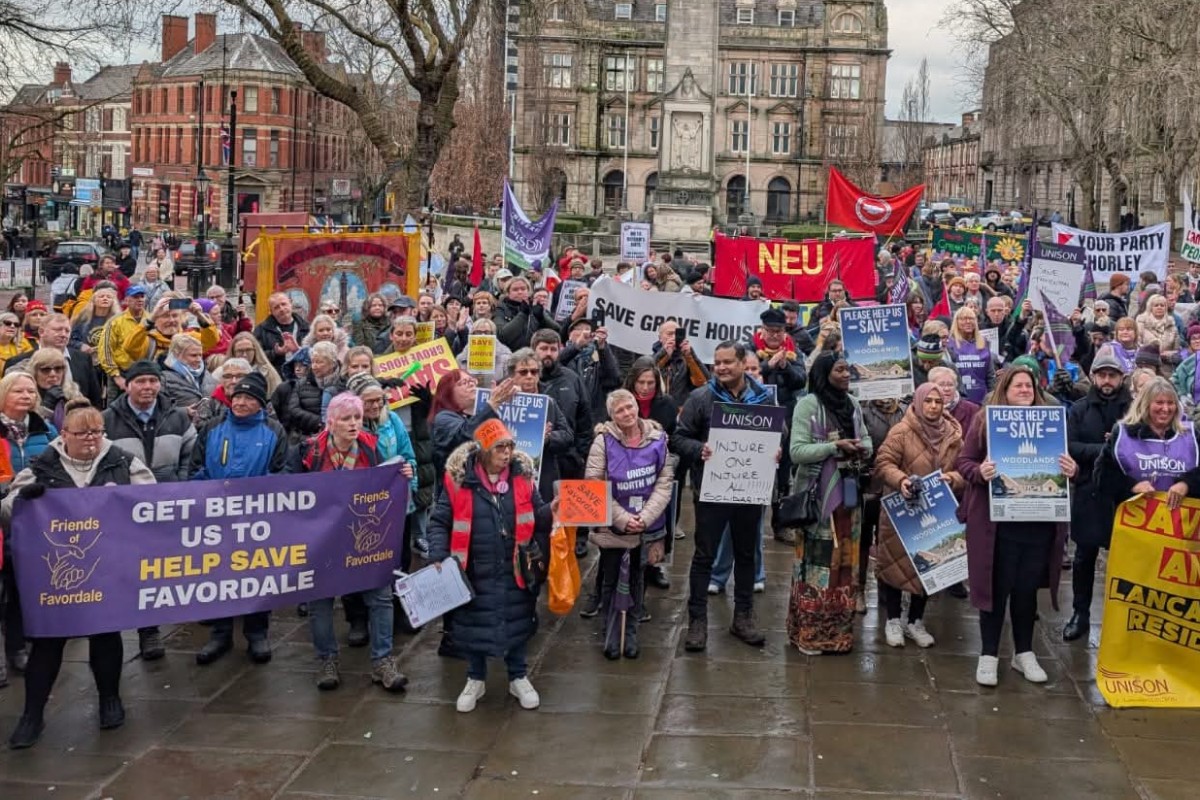This 1 May will be an important date in the diary for workers internationally and the British political establishment alike.
For workers across the world, May Day is an opportunity to commemorate the history of the labour movement; a celebration of class unity, struggle, and solidarity.
Today, with capitalism spinning in a downward spiral, and the ruling class waging war on workers, the poor, and the oppressed, it is more vital than ever that we reclaim the militant traditions of the past.
This means getting organised, and fighting for revolution against the billionaire class.
Litmus test
For the strategists of capital, 1 May will be short on partying and full of panic. For them, the term ‘mayday’ will be used as a distress call – signifying fear, not festivity.
That is because this day also sees voters across England go to the polls for the first time since last year’s general election, with six mayoral positions and seats in 23 councils up for grabs.
Local elections normally pass by unnoticed, gathering little attention. And for much of the public, that will remain the case this year. As is increasingly the case, given the rotten state of mainstream politics, the most popular vote is likely to go to ‘none of the above’.
With hatred towards Starmer’s government building, however, these elections could prove to be an opportunity for some to cast a protest vote; to register their anger against Labour, the Tories, and the rest of the establishment.
In particular, the parliamentary by-election in Runcorn and Helsby could be a litmus test for the discontent towards Starmer’s Labour, which is currently defending the North West seat.
Alarm bells
Enter Nigel Farage. The Reform UK leader has made his intentions clear. He and his party have their eyes not only on Runcorn, and potentially on the Lincolnshire and East Yorkshire mayoralities, but on councils and constituencies in both former Conservative and Labour heartlands.
With Labour slumping in the polls, and anger at the traditional parties growing, the ever-opportunistic Farage has jumped at the chance to fill the vacuum in British politics.
According to aggregated survey results, support for Labour has dropped by 11 percentage points since last July’s general election, from 34 percent to 23 percent – the largest fall for any party in its initial months in power. Meanwhile, Reform is out in front on 25 percent, with the Tories in third place on 21 percent.
The latest YouGov polling roughly chimes with this, putting Reform, Labour, and the Conservatives on 25, 23, and 20 percent respectively. Another recent survey from More in Common, meanwhile, puts these parties in a three-way tie on 24 percent.
On this basis, translated into parliamentary arithmetic, More in Common’s electoral model predicts that Farage’s party could win as much as 180 seats at the next national contest.
Latest YouGov Westminster voting intention (21-22 April)
Ref: 25% (+2 from 13-14 Apr)
Lab: 23% (-1)
Con: 20% (-1)
Lib Dem: 16% (+2)
Green: 10% (-1)
SNP: 3% (=) pic.twitter.com/YTS2m9oOX7— YouGov (@YouGov) April 23, 2025
A shock poll by Find Out Now from last week, meanwhile, puts Reform way out ahead on 28 percent, compared to 20 percent for both Labour and Tories.
It is estimated that such a result would deliver Reform UK a whopping majority in the House of Commons, with 374 seats. By comparison, Labour and the Conservatives would be wiped out, reduced to a rump of just 41 and 58 seats, respectively.
Hence the alarm bells ringing in the corridors of Westminster.
📊 MRP Poll – Reform Just 146 Seats Short!
RFM: 180 (+175) | 24%
LAB: 165 (–246) | 24%
CON: 165 (+44) | 24%
LDM: 67 (–5) | 13%
SNP: 35 (+26) | 2%
IND: 10 (+4) | 4%
PLC: 5 (+1)
GRN: 4 (=) | 8%Reform surging ahead – Labour crumbling
[More in Common/Election Maps] April 2025… pic.twitter.com/DEgam4N32E
— The Reform Daily (@ReformDaily_) April 19, 2025
🚨 NEW | Poll suggests **Labour wipeout**
🟣 REF: 28% (-)
🔵 CON: 20% (-)
🔴 LAB: 20% (-2)
🟠 LD: 14% (-)
🟢 GRN: 13% (+3)Via @FindoutnowUK , 23 Apr (+/- vs 16 Apr) pic.twitter.com/ldP9EA9795
— Stats for Lefties 🍉🏳️⚧️ (@LeftieStats) April 24, 2025
Uncertainty and volatility
The next general election is not scheduled for some time – to be held by August 2029, at the latest. Nevertheless, the splintering of Britain’s electorate amongst four or five parties, as indicated in the latest surveys, is likely to be a significant feature of UK politics in the period ahead.
This, in turn, will generate enormous political uncertainty and volatility: a reflection of the general instability of British – and world – capitalism.
Britain’s first-past-the-post voting system was designed to deliver big, stable majorities for one of two main parties: the Tories or Labour. And so it did for decades.
In most postwar elections, until recent times, around 80-90 percent of the vote collectively went to this blue-red duopoly. In turn, power alternated between one and the other; between British capitalism’s A and B-team.
But now, with votes spread far more evenly across the board, even small percentage point changes can produce large overall swings in Parliament, as the aforementioned polling predictions indicate.
Starmer’s Labour and the Tory Party have the most to lose from this process – as is likely to be demonstrated by this week’s elections. Both are set for a hammering on Thursday, as voters desert Britain’s traditional parties of government in favour of Reform, the Lib Dems, and the ‘plague on all your houses’ option.
Tory worries
The Conservatives have perhaps the most to be concerned about. Kemi Badenoch’s party faces an existential threat: haemorrhaging support – from an already-historically-low base – to the Lib Dems in the south, and to Reform UK in the Midlands and the North.
While some commentators talk about the prospect of a right-wing pact between the Tories and Reform in future general elections, Badenoch has rejected the idea. After all, she notes, Farage’s aim is to “destroy” the Conservatives.
Indeed, Nigel Farage clearly has aspirations to enter Downing Street without a helping hand from the Tories. “It’s a takeover,” the Reform leader asserted recently, speaking on the campaign trail. “The Conservatives are gone; just irrelevant. This is a new force.”
Seeing the writing on the wall, a layer of Tory members and donors are jumping ship.
On the one hand, those who have traditionally made up the frothing ranks of the Conservative Party can now be seen attending Reform rallies – clad in Union Jacks and ‘Make Britain Great Again’ paraphernalia.
On the other hand, Farage is courting the Tories’ financial backers, seemingly with some success. “It does feel like momentum is behind Reform,” commented businessman Mohamed Amersi, formerly a major Conservative donor.
This is an indication of how sections of the ruling class are now thinking: seeing their historic representatives in disarray, and sensing which way the wind is blowing.
Championing workers
At the same time, Farage and his party are clearly seeking to grab working-class votes off of Starmer’s Labour by tapping into workers’ grievances around jobs and services.
Speaking recently at a campaign event in a working men’s club in County Durham, where residents will be going to the ballot box on 1 May, Farage discussed how Reform is “parking their tanks on the lawns of the Red Wall”.
The crisis at British Steel has been a godsend for Reform, in this respect. While Labour ministers have dithered, offering no guarantees to secure workers’ livelihoods, Farage and co. have come out forcefully in favour of nationalisation.
“Broken Britain” faces an “industrial massacre”, Farage correctly asserts. And Reform, he promises, will “reindustrialise” the country. “We will have a proper, sound industrial policy.”
Cannily, while Starmer desperately proves his credentials as a loyal servant of the establishment, Farage presents himself as a champion of the working class.
Labour once “existed to give working men a voice”, Farage states, but under Starmer it is a “very middle-class party, full of human rights lawyers” who don’t care about the concerns of “working people”.
The Reform leader vocally denounces Labour’s cuts to the winter fuel allowance, for example. Recently, meanwhile, he and his team posed for photographers alongside trade unionists at the Scunthorpe steelworks, holding placards saying ‘save our steel’.
Reform UK are on 30% in the Red Wall.
Labour have completely betrayed working class communities.
Britain is Broken. Britain needs Reform. pic.twitter.com/ZpjiznJIZJ
— Nigel Farage MP (@Nigel_Farage) April 15, 2025
By contrast, according to opinion polls, fewer than one in five blue-collar workers say they would now vote Labour. And striking workers – for example, in Birmingham – are already coming into conflict with Starmer’s party.
In other words, while Starmer and his cronies seek to outflank Reform on the right when it comes to questions like migration and militarism, Farage is seeking to siphon votes off of Labour by filling the space on the left in regards to bread-and-butter issues.
‘Lesser-evilism’
The rise of Reform has also revealed the bankruptcy of the so-called ‘left’.
Instead of providing bold socialist answers to the burning class questions that ordinary people face, such ‘lefts’ hysterically bang the drum about the ‘threat of the far right’, and allow themselves to get completely sucked into the ruling class’ culture war.
In doing so, rather than focussing their fire on Starmer’s Labour and the establishment, i.e. those attacking the exploited and the oppressed, they end up lining up behind these capitalist cretins in an effort to ‘stop Farage’.
Day of action Sat 26 April – Stop racist Reform 🛑
Reform UK want to grab more councillors – and another MP! – on May 1. They can be stopped – but we need to see the biggest day of campaigning and resistance. Join us! #standuptoracism pic.twitter.com/uskP0KNSaR
— Stand Up To Racism (@AntiRacismDay) March 31, 2025
Tonight in Birmingham, we united against the far-right — demanding real solutions, not scapegoats.
This is just the start.
The first of many rallies.
The launch of a movement — a coalition of unions, activists and communities standing together to fight fascism.
Get ready! 💪🏽 pic.twitter.com/VYeYCAe6cJ
— Zarah Sultana MP (@zarahsultana) March 29, 2025
Already, as the liberal centre-ground collapses, and Britain’s political landscape fractures and polarises, some Labour schemers are hatching plans to forge a French-style ‘Republican front’ against Reform.
Workers and youth must steer well clear of such ‘lesser-evilism’. It goes without saying that Farage is a reactionary demagogue, who has nothing to offer the working class. But popular fronts with cynical and hypocritical liberals are no solution.
Our slogans must be: All of us against all of them! Kick out all the warmongers, liars, and racists!
Socialist revolution
As the crisis of capitalism deepens – and the world economy lurches into a new turbulent period of trade wars, inflation, and recession – the need for an independent class position will become ever clearer.
Under the hammer blow of events, consciousness will be transformed and re-transformed. To growing layers, it will be increasingly evident that the problem is not with this or that ‘evil’ politician or corrupt party, but with the entire system.
It is capitalism that breeds conflict and chaos; attacks and austerity; instability and insecurity.
A tsunami of cuts is heading towards the working class, in Britain and internationally. Social explosions and sharpening class struggles are on the order of the day.
The only way forward is through world socialist revolution. This is the programme and perspective that we – the communists of the RCP – are fighting for. Join us in this task.
View this post on Instagram
Bosses and millionaires ditch the Tories
Jonathan, Birmingham
The Conservative Party’s steady slide into obscurity has recently accelerated, with one of their biggest donors abandoning them.
Homeserve CEO Richard Harpin has given over £3.5 million to the Tories since 2010, and provided £33,000 on a monthly basis to their northern HQ in Leeds.
Without his support, the HQ will likely shut down, leaving the door wide open for Reform to make gains in the region.
The Tories are reportedly fighting to stem the loss of their wealthy donors, many of whom are now flocking to Farage’s insurgent party.
Of course, while we are glad to see the ignominious decline of the Tories, the replacement of one reactionary party with another is not a step forward.
The whole affair shows the importance of maintaining political independence: disappoint your backers, and your party will collapse into obscurity.
£10 million of Labour’s funding for the last election came from just three millionaires and an electricity company: quite a strong motivator to obey the capitalists and continue austerity.
This is why being funded by our members and supporters is the only way to fund the RCP: the capitalists will never pay for their own destruction!






